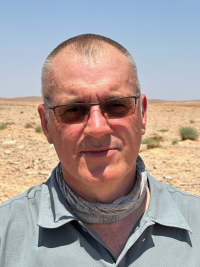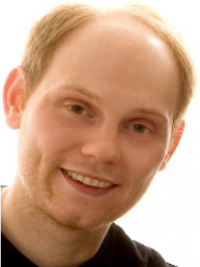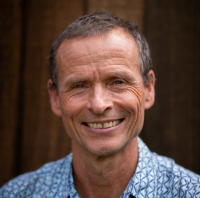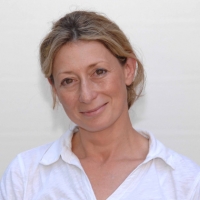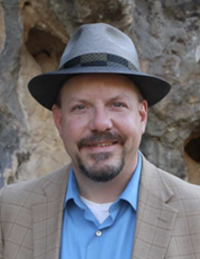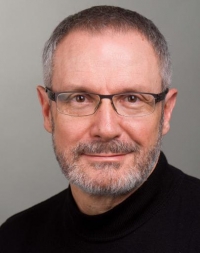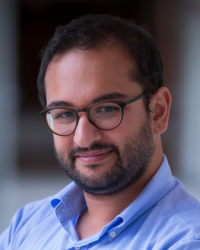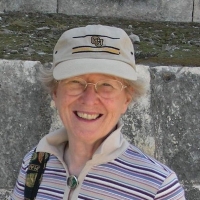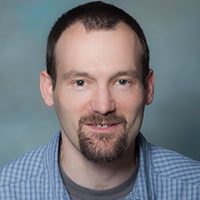Exploring the Origins of Today's Humans
Biographical Sketches: Co-Chairs
Simon Fraser University
Mark Collard is the Canada Research Chair in Human Evolutionary Studies and a Full Professor in the Department of Archaeology at Simon Fraser University in Burnaby, British Columbia, Canada. After the 1987 Black Monday stock market crash put paid to his career as a private client stockbroker in the City of London, Collard pursued an undergraduate degree in archaeology and prehistory at the University of Sheffield. Subsequently, he completed a Ph.D. in human palaeontology at the University of Liverpool. Since that time, he has taught at universities in the UK, USA, and Canada, and conducted research on a wide range of anthropological topics using the conceptual and analytical tools of evolutionary biology. Among the topics he has worked on are the identification of species in the hominin fossil record; the reconstruction of hominin evolutionary relationships; the estimation of body mass, stature, and age from skeletal material; the processes responsible for the evolution of cultural diversity; the determinants of technological variation among non-industrial populations; and the colonisation of the Americas. Currently, Collard is interested in the evolution of religion, hunter-gatherer mobility, and evolutionary medicine. In addition, he is conducting archaeological fieldwork in Jordan.
University of Utah
Kristen Hawkes is Distinguished Professor of Anthropology at the University of Utah. Her principle interests are the evolutionary ecology of hunter-gatherers and human evolution. She studies age and sex differences in behavior, using comparisons between people and other primates, paleoanthropology and evolutionary modeling to develop and test hypotheses about the evolution of human life histories and social behavior. Hawkes has pursued ethnographic fieldwork in highland New Guinea, Amazonia, and eastern and southern Africa. She is a member of the Scientific Executive Committee of the Leakey Foundation, the American Academy of Arts and Sciences, and the National Academy of Sciences.
Biographical Sketches: Speakers
Princeton University
Joshua Akey is Professor of Ecology and Evolutionary Biology at the Princeton University Lewis-Sigler Institute for Integrative Genomics. The long-term research goals of his laboratory are to understand patterns of genetic variation within and between populations and to use this information to address fundamental problems in Biology and Evolution. To this end, Akey is pursuing research projects in two broad and interrelated areas: 1) human population and evolutionary genomics and 2) delineating the genetic architecture of quantitative traits and complex diseases. The goals of these studies are to understand the genetic structure of human populations, infer important demographic events in human history, identify regions of the genome that have been affected by natural selection, and map genes that contribute to susceptibility of complex diseases and mediate inter-individual variation in quantitative traits. The raw data that we use to answer the questions described above include whole genome DNA sequence information and massively parallel measures of gene expression, protein, and metabolite levels. These data sets are inherently complex and quantitative, and we develop theoretical, statistical, and computational tools to extrapolate meaningful information from them. Previously, Akey was a Professor in the Department of Genome Sciences at the University of Washington where his research focused on understanding the evolutionary forces that shaped patterns of human genomic diversity and the genetic architecture of complex phenotypes. He received a B.S. degree in Molecular Biology from the University of Pittsburgh and a Ph.D. in Human Genetics from the University of Texas-Houston
UC San Diego
Pascal Gagneux is CARTA's Executive Co-Director, a Professor of Pathology and Anthropology, and the Department Chair of Anthropology at UC San Diego. He is interested in the evolutionary mechanisms responsible for generating and maintaining primate molecular diversity. The Gagneux laboratory studies cell-surface molecules in closely related primates species. His focus is on glycans, the oligosaccharides attached to glycolipids and glycoproteins of the surfaces of every cell and also secreted into the extra-cellular matrix. Gagneux's laboratory is exploring the roles of molecular diversity in protecting populations from pathogens as well as potential consequences for reproductive compatibility. Dr. Gagneux’s interest is in how glycan evolution is shaped by constraints from endogenous biochemistry and exogenous, pathogen-mediated natural selection, but could also have consequences for sexual selection. Dr. Gagneux has studied the behavioral ecology of wild chimpanzees in the Taï Forest, Ivory Coast, population genetics of West African chimpanzees, and differences in sialic acid biology between humans and great apes with special consideration of their differing pathogen regimes. In 2011, while Associate Director of CARTA, Dr. Gagneux helped to establish a graduate specialization in Anthropogeny at UC San Diego. This wholly unique graduate specialization is offered through eight participating graduate programs in the social and natural sciences at UC San Diego.
Eberhard Karls University Tübingen and Senckenberg Centre for Human Evolution and Palaeoenvironment, Tübingen
Professor Harvati-Papatheodorou is a paleoanthropologist specializing in Neanderthal evolution, modern human origins and the application of 3-D geometric morphometric and virtual anthropology methods to paleoanthropology. She conducted her doctoral studies (2001) at the City University of New York and the New York Consortium on Evolutionary Primatology (NYCEP), was Assistant Professor at New York University (2001-2004) and Senior Researcher at the Max Planck Institute for Evolutionary Anthropology in Leipzig (2004-2009). Since 2009 she is Full Professor at the University of Tübingen, as well as adjunct Professor of Anthropology at the City University of New York Graduate Center and resource faculty for the New York Consortium of Evolutionary Primatology (NYCEP). Harvati-Papatheodorou is the recipient of two prestigious European Research Council grants (ERC Starting Grant ‘Paleoanthropology at the Gates of Europe’, 2011; ERC Consolidator Grant ‘Human Evolution at the Crossroads’, 2016). She currently directs the Cross-Faculty DFG Centre for Advanced Studies ‘Words, Bones, Genes, Tools: Tracking linguistic, cultural and biological trajectories of the human past’ at the University of Tübingen. Her work has been published in Nature, Science, PNAS, Nature Ecology & Evolution and other specialist as well as general science journals. She was awarded the Research Award of the state of Baden-Württemberg in 2014 for basic research. She has conducted fieldwork in Europe and Africa, most recently in Greece.
University of Wisconsin—Madison
Professor John Hawks is an internationally recognized expert on human evolution and genetics. His most recent fieldwork in South Africa focuses on the Rising Star cave system, where he is a core member of the team that discovered the previously unknown species Homo naledi. He is also known for his work demonstrating the rapid evolution of modern humans within the past 40,000 years; and for exploring the contribution of ancient Neandertals to the ancestry of people living today. He has done fieldwork in Africa, Asia and Europe, combining skeletal evidence from fossils with new information from genetics to uncover how humans evolved. His work on human genetics connects to global health, including research exploring the structure of genetic networks underlying celiac disease and type 2 diabetes.
Hawks’ work has been featured in documentaries from PBS Nova, PBS Secrets of the Dead, National Geographic, Science Channel, and the BBC. Print coverage of his work has included cover and feature articles in Discover, Scientific American, Archaeology, Science News, New Scientist, coverage in the New York Times, USA Today, Time, Der Spiegel and many others.
Professor Hawks has been a leader in public outreach and the movement toward open science. His blog (http://johnhawks.net) was recognized by Nature as one of the top 15 science blogs, and received more than 700,000 visits from readers in 2019, more than 40% outside the U.S. He taught a massive open online course (MOOC) titled “Human Evolution: Past and Future” for the University of Wisconsin-Madison in 2014, with a registration of more than 40,000 students worldwide.
Hawks has been at the University of Wisconsin-Madison since 2002 and is presently the Vilas-Borghesi Distinguished Achievement Professor of Anthropology. He serves as Associate Chair of Anthropology and an associate member of both the Department of Zoology and the J. F. Crow Institute for the Study of Evolution. He is an honorary professor and associate of the Evolution Studies Institute at the University of the Witwatersrand, Johannesburg, South Africa.
Collège de France
Professor Jean-Jacques Hublin is Chaire de Paléoanthropologie at the Collège de France and the former Director at the Max Planck Institute of Evolutionary Anthropology in Leipzig (Germany). He has also served as an honorary professor at the University of Leipzig since 2006 and has taught at the University of Leiden (Netherlands) since 2010. Prof. Hublin obtained his PhD in Vertebrate Paleontology and Human Paleontology at the University of Pierre et Marie Curie in Paris (1978), and completed his habilitation in Anthropology at the University of Bordeaux (1991). He first joined the Centre National de la Recherche Scientifique (1981-2000) as a research fellow before continuing as a research director and team leader. Prof. Hublin then joined higher education as a professor at the University of Bordeaux 1 (1999-2004). He has also taught as a visiting professor at the University of California at Berkeley (1992), Harvard University (1997), and Stanford University (1999 and 2011). In 2004, Prof. Hublin joined the Max Planck Institute of Evolutionary Anthropology in Leipzig (Germany) where he created and developed the Department of Human Evolution. He is one of the founders of the European Society for the Study of Human Evolution (ESHE), which connects researchers from European countries. He has had the honor of chairing ESHE since its creation in 2011. Since the 1990s, Prof. Hublin has played a pioneering role in the development of virtual paleoanthropology. In addition to his contributions to the understanding of the African origins of Homo sapiens, he is a well-known specialist on Neandertals. He has played a central role in understanding their origin and evolution and in analyzing the processes of their replacement by Homo sapiens. More recently he has been involved in the study of Denisovans in Russia and China. Finally, Prof. Hublin made a major contribution to the study of the history of paleoanthropology with the publication of a biography of Jacques Boucher de Perthes, French founder of Prehistory. In 1990 Prof. Hublin received the F. Millepierre Prize from the Académie Française; in 2013, the Rudolf-Virchow Prize from the Prinz Maximilian zu Wied Foundation; in 2017, the Royal Wissam al-Kafaa al-Fikria from his Majesty Mohamet VI in person. In 2019, he received the French distinction of Knight of the Legion of Honor.
University of Pennsylvania
Iain Mathieson is an Assistant Professor of Genetics at the University of Pennsylvania. He trained originally in mathematics and statistics before receiving his PhD in genetics from the University of Oxford and performing postdoctoral research in ancient DNA at Harvard University. His work focuses on the genetic basis, distribution and evolution of complex traits in humans. He uses ancient DNA to record and understand the evolution of complex traits as humans migrated throughout the world, developed agriculture, and created and experienced new environments. In particular, he tries to integrate ancient DNA data with information from medical genetics (e.g. Genome-wide association studies), and anthropology to understand the full picture of how genetics and environment interact today, and interacted in the past, to shape human phenotypic diversity.
UCLA
Sriram Sankararaman is an assistant professor of Computer Science and Human Genetics at UCLA. His research interests lie at the interface of computer science, statistics and biology. He is interested in developing statistical machine learning algorithms to understand evolutionary processes and the genetics of complex phenotypes.
University of California, Davis
Teresa Steele is Professor of Anthropology at UC Davis and a paleoanthropologist who studies the later phases of human evolution – the emergence and evolution of people who were behaviorally and anatomically like recent humans. Her research focuses on why some of these human populations spread out of Africa about 50,000 years ago and were able to replace the Neandertals in Europe. She is particularly interested in the origins of recent human cultural abilities and the relationship between changes in technology, subsistence, and demography. She studies the mode and tempo of human behavioral evolution during this time through zooarchaeology – reconstructing human subsistence and ecology through the patterns of variation found in animal bones and mollusks preserved in archaeological sites. She conducts research in South Africa, Morocco and France.
University of Colorado
Paola Villa is an Italian archaeologist and a researcher at the University of Colorado Museum of Natural History. She has a doctorate in Classical Archaeology from the University of Rome and a Ph.D. in Prehistoric Archaeology from the University of California at Berkeley. She was Professor at the University of Bordeaux in France between 1993 and 1998. Between 2003 and 2013 she has done research on the Middle Stone Age of South Africa funded by grants from the National Science Foundation of USA, the Leakey Foundation, the Wenner-Gren Foundation and South African organizations. Together with South African colleagues, lithic specialists and an expert flint knapper from France (Sylvain Soriano) she carried out studies of five major MSA sites in South Africa: Blombos, Klasies River Mouth, Sibudu, Rose Cottage and Border Cave.
She has recently started a project on evolutionary changes in Neandertal lithic technology in Central Italy, together with Italian colleagues. The project is funded by the National Science Foundation and the Leakey Foundation. Her research in South Africa and Italy has been published in Proceedings of the National Academy of Science USA, Journal of Archaeological Science, Science, Journal of Anthropological Research, PLOS ONE and Journal of Human Evolution.
UC Davis
Tim Weaver is a Professor in the Department of Anthropology, University of California, Davis. He graduated with a double major in Computer Science and Earth Sciences from Dartmouth College (1995), and he received a Ph.D. in Anthropology from Stanford University (2002). He was a postdoc in the Department of Zoology, University of Wisconsin, Madison (2003-2004), and the Human Evolution Department, Max Planck Institute for Evolutionary Anthropology (2004-2006). He joined the UC Davis Anthropology Department in 2006.
Weaver is a paleoanthropologist. He studies human evolution, with a focus on the origins, evolution, and disappearance of Neandertals, and the related topic of the origins and evolution of the African ancestors of present-day humans. While his emphasis is on the later phases of human evolution, he has also worked on earlier periods, mostly in the context of the evolution of human bipedal walking and running and childbirth. Most of his publications address specific questions about why ancient human skeletons look the way they do. He strives to integrate approaches and datasets from population and molecular genetics with traditional studies of the fossil and archaeological records.
